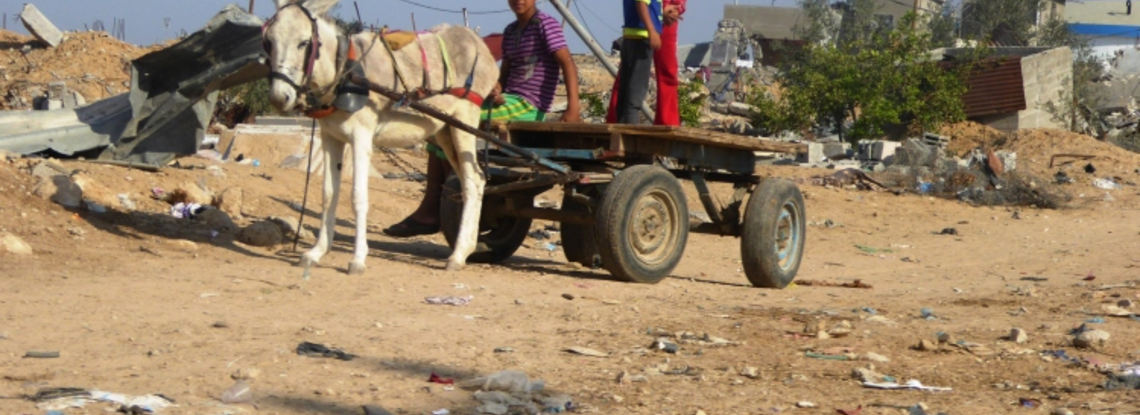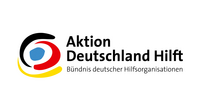Gaza 2014

"Our children’s souls have been relieved"
Pedagogical first aid for a traumatised generation
The range of the humanitarian disaster in the Gaza Strip1 is inconceivable: according to a survey by Palestinian emergency health care services, 2143 Palestinians, of which 1460 were civilians, were killed through acts of war. 11.000 people were injured in the attacks and the civilian infra-structure was totally destroyed.
In late October 2014, the Friends of Waldorf Education, who provided emergency pedagogic first aid ever since the first acts of war in the Gaza Strip in 2008 and 2009, sent a team of 14 emergency pedagogues into the hermetically sealed off region2. There they carried out a humanitarian first aid mission, which lasted two weeks. The aims of the pedagogical first aid mission in the war-region were the psycho-social stabilisation of traumatised local pedagogues and therapists, counselling of Palestinian parents on how to cope with their children’s trauma-induced behavioural changes, as well as the emergency pedagogic acute- and early-intervention to stabilise traumatised children and adolescents.
“I can’t sleep at night”: Traumatised specialists need help
Mohammed (51) is a psychotherapist in Gaza City. During the war he lost his entire family and his house in as single missile attack. He only survived because he was not at home when the attack happened. Since the day of this tragic loss, Mohammed is haunted by terrors and nightmares and suffers under severe insomnia: “I sleep only 30 minutes per night. I lay awake, toss and turn on my mattress until the night turns into day. I suffer under severe panic attacks.” Also, Mohammad is haunted by an agonising sense of guilt because he could not prevent his family’s death while he survived.
Other helpers have lost their feelings at all and show emotional instability. However, what traumatised children need the most are stable adults, who are able to reduce the children’s fear and anxiety. This is why it is of great importance to stabilise the pedagogical personnel and psychosocial helpers in war- and crisis-regions and thus enable them to provide professional help to traumatised children and adolescents.
“There are no safe places left around here”: Traumatised children need safe places
In Deir el Balah the four year old girl Halla stands uninvolved and listless beside the emergency pedagogic round games. Her mother Saidaa (45) tells us that the village was attacked on the fifth day of war. When Saidaa’s house was hit by a grenade, her children fled in panic and wandered the streets confused and disoriented. Halla’s brother Abbas is one of the victims in Abu al Ajeen. Ever since the attacks, Halla suffers under severe panic attacks and insomnia. As most of the children we encountered, Halla stopped using the toilet and started wetting herself again. “I carry her to the toilet at night. I have lost everything- I don’t even have clothes to change”, her mother says. Helplessness and despair are written all over her face.
As in most war conflicts, the distress of children and adolescents is particularly high in the Gaza Strip. According to the UN, 494 children and adolescents below the age of 14 died in the attacks, about 3000 children were injured through combat. Many have lost their families. According to a UN-report, one can expect that every child in the Gaza Strip is affected by the crisis and needs psychological support.
Children need safe places to process their traumatic experiences. In cooperation with the Nawa-Centre for Culture and Arts, Child Friendly Spaces were put up in Beit Hanoun, Abu al Ajeen and Deir el Balah during this emergency mission. They will provide inner and outer safety to the children and adolescents. At the Child Friendly Spaces, age appropriate methods for trauma-compensation are offered. Traumatised children experience security, structure and stability, which enables them to re-establish trust and confidence in their strengths, their fellow human beings and their social environment.
“I turned into a crazy person”: Traumatised parents need educational counselling
Little Norhan (7) from Abu Al Ajeen wants to spend night and day in his mother’s arms, because this is the only place where he can control his fear. Norhan’s teacher tells his mother Shahad (45) that the boy has become very inattentive ever since the war started. Norhan’s sister Afnan (10) used to be a good student, her mother tells. Nowadays she is not able to concentrate: “I started slapping my daughter in the face to make her concentrate again. I turned into a crazy person”, Shahad confesses under tears.
During parent counselling sessions in the Gaza Strip, the emergency pedagogues receive many variations of such reports on trauma induced stress reactions. Due to their traumatising experiences, many children develop psychosomatic reactions or behavioural disorders, which prove to be pedagogical challenges for parents and pedagogues: Terrors, bed wetting, the refusal to go to school, oppositional, delinquent behaviour, and trauma-induced dissociations. Due to their own severe trauma, many parents have lost an emphatic approach to their children’s needs. Other parents are desperate and cannot understand their children’s behaviour. This helplessness in coping with psycho-traumatological symptoms proves that parent counselling is indispensable. This is why the emergency pedagogues established parent-meetings, where parents could be introduced to approaches on how to deal with their children’s trauma induced behavioural changes.
“The soul has been relieved”: Erecting trauma-pedagogic Child Friendly Spaces
Many children and adolescents in the Gaza Strip experience the third war within a time span of six years. While the traumata of the last war have not yet healed, new war-time-traumata are already accumulating. It is a state of ongoing, sequential re-traumatisation, which is enforced through the transgenerational transmission of unresolved traumata.
In the light of this background, it is particularly important that, besides emergency pedagogic acute interventions, sustainable trauma pedagogic structures for the long-term psycho-social stabilisation of the children are established. This is why the Friends of Waldorf Education and the Nawa-Centre for Culture and Arts plan to build up an emergency pedagogic walk-in clinic in Deir el Balah. The clinic will also offer trauma pedagogic seminars for pedagogues and a parent information centre. Both organisations plan to create Child Friendly Spaces in Abu al Ajeen, Deir el Balah and Beit Hanoun. This will provide traumatised children and adolescents with secure places, where they find assistance in coping with their experiences and which offer them dependable offers of relationship.
Many reactions show that the emergency pedagogic measures produce fast results: a relaxation of the muscular tonus, a decrease of trauma induced symptoms, such as bed wetting, nightmares, listlessness, etc. Furthermore the team experienced how the children’s eyes turned bright again as they rediscovered the joy of being a child. The parents also reacted quickly to their children’s changes. Negav (54), a mother of nine, expresses her feelings as we depart from Deir el Balah: “What you have given us is worth more than money and riches!” and Nourshin (35), a mother of five adds: “This was something for the soul. Our children’s souls have been relieved!”
Bernd Ruf
Annotations:
1. All of the following numbers stem from various internet publications and are mostly based on information of the UN Office for the Coordination of Human Affairs (UN-OHCA Situation Updates)
2. The emergency pedagogic crisis intervention team was made up of: Heike Böhret (early childhood educator), Peter Elsen (eurythmist), Monika Görzel-Straube (Waldorf educator, trauma educator), Frank Hornuff (documentation), Dennis Meckler (documentation), Ursula Middelkamp (early childhood educator, parent counsellor), Ursula Schöbel (psychologist, psychotherapist), Dr. Christian Schopper (psychiatrist, psychotherapist), Hans-Joachim Sennock (Waldorf educator), Reinaldo Nascimento (Waldorf educator, experiential educator), Bernd Ruf (director of operations, special education teacher), Bob Witsenburg (doctor), Kristina Wojtanowski (coordination).
3. All names changed for the protection of privacy
4. UN OCHA http://unispal.un.org/UNISPAL.NSF/0/2D2D273FE8263F6785257D3A006612DF
5. Fischer, G. (20094): Lehrbuch der Psychotraumatologie. München-Basel
6. Ruf, B. (2011): Erste Hilfe für die Seele. Wie Kinder und Jugendliche durch Notfallpädagogik schwere Traumata überwinden lernen. In: Neider, A. (Hrsg.) (2011): Krisenbewältigung, Widerstandskräfte, Soziale Bindungen im Kindes- und Jugendalter. Stuttgart.173 – 230


